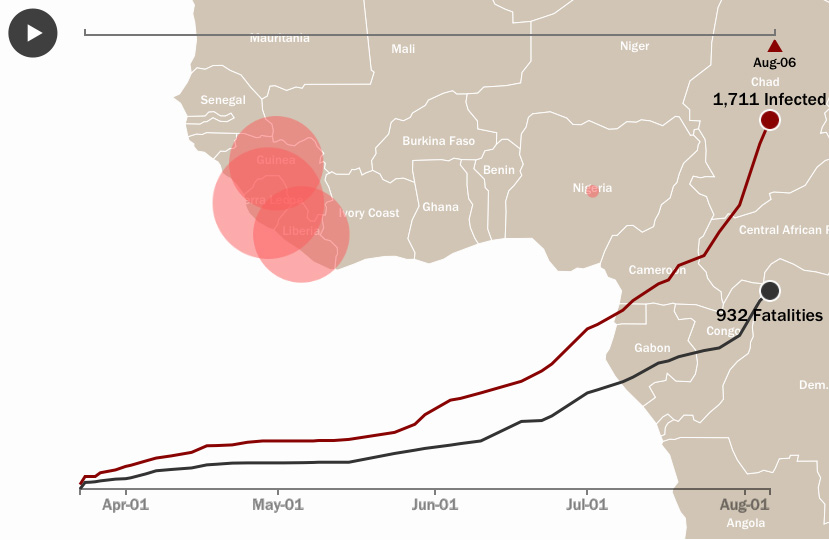Researchers believe the Ebola outbreak in West Africa which has already killed over 960 people may have started with a 2-year-old from a remote town in Guinea.
In a report published in the New England Journal of Medicine (NEJM), the researchers, who are experts in viral hemorrhagic fevers, conclude that the first case of the current Ebola virus outbreak was probably a 2-year-old child who died near the town of Guéckédou, Guinea in December. Guéckédou is located near the borders of Sierra Leone and Liberia, where the Ebola outbreak is spreading, and is considered the epicenter of the outbreak.
The research team investigated transmission patterns, and interviewed affected families, people suspected of having Ebola, and residents of villages where Ebola deaths and infections have occurred. They also sifted through hospital documents. The child seems the likely first case, they found, though it remains unclear how he or she became infected. The researchers believe a health care worker from Guéckédou proceeded to carry the virus to nearby villages and triggered the spread.
To better understand the virus, the researchers took blood samples from 20 patients who were hospitalized in Guéckédou and nearby towns with symptoms of Ebola such as diarrhea, vomiting, or bleeding. While the virus traced to Guinea is 97% similar to the strains of Ebola found in previous outbreaks in the Democratic Republic of Congo and Gabon, researchers believe it most likely originated in Guinea (perhaps from a fruit bat) and was not brought into the country from the others.
The virus has now spread to Sierra Leone and Liberia, and there are cases popping up in Nigeria. Ebola is spread through direct contact with bodily fluids like blood and vomit. Family members taking care of their infected relatives, at least in the beginning of the outbreak, were likely unaware their family member had Ebola and became infected with the disease. The lack of resources in the health care systems in rural West Africa means not only do patients have a low survival rate, but health care workers can get infected themselves while treating patients.
Cultural traditions are also believed to have played a role in the disease spread, according to regional experts. “Liberia is full of cultural practices that propagate the spread of the disease, the biggest being the veneration of the dead, including washing and kissing the corpse,” said Ken Isaacs, vice president of international programs and government relations for the relief organization Samaritan’s Purse in a House Subcommittee hearing last week. “The corpse of an Ebola victim is at its maximum point of contamination in the hours immediately following death.”
Public health groups are sending more workers into the region to try and get ahead of the disease. So far in the outbreak there have been 1,779 confirmed cases and 961 deaths.

More Must-Reads from TIME
- Cybersecurity Experts Are Sounding the Alarm on DOGE
- Meet the 2025 Women of the Year
- The Harsh Truth About Disability Inclusion
- Why Do More Young Adults Have Cancer?
- Colman Domingo Leads With Radical Love
- How to Get Better at Doing Things Alone
- Michelle Zauner Stares Down the Darkness
Contact us at letters@time.com